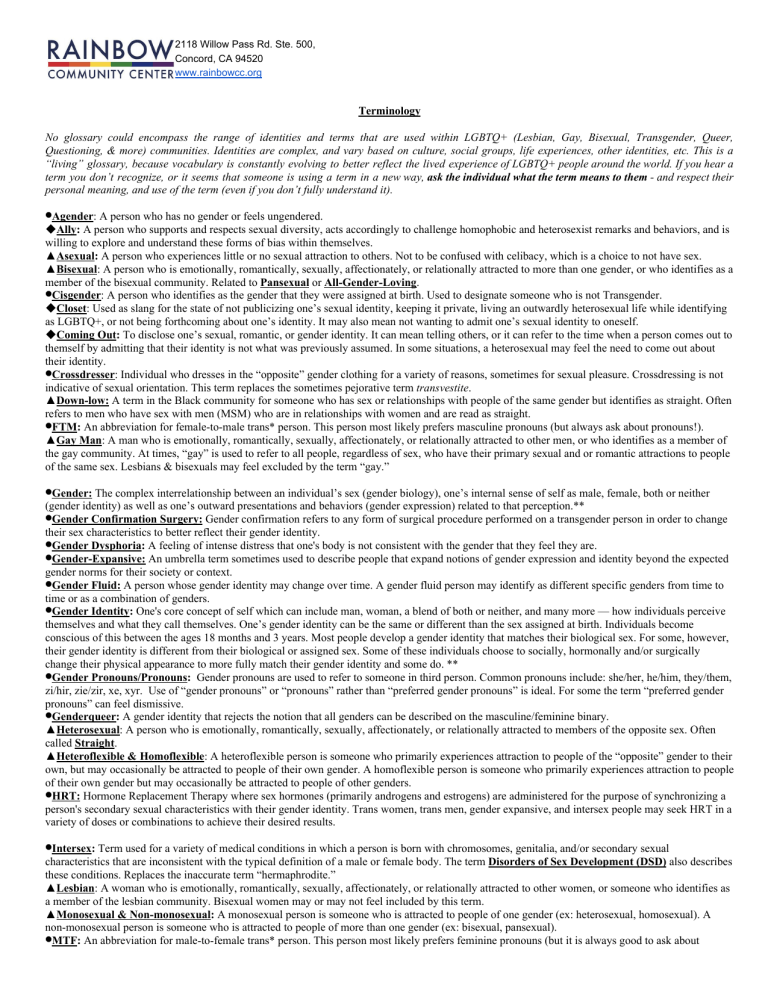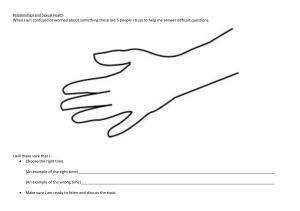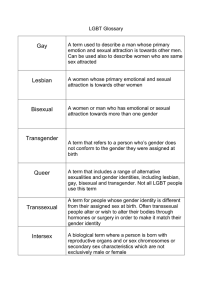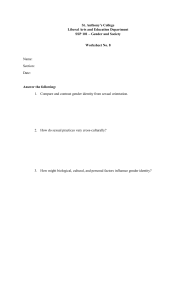
2118 Willow Pass Rd. Ste. 500, Concord, CA 94520 www.rainbowcc.org Terminology No glossary could encompass the range of identities and terms that are used within LGBTQ+ (Lesbian, Gay, Bisexual, Transgender, Queer, Questioning, & more) communities. Identities are complex, and vary based on culture, social groups, life experiences, other identities, etc. This is a “living” glossary, because vocabulary is constantly evolving to better reflect the lived experience of LGBTQ+ people around the world. If you hear a term you don’t recognize, or it seems that someone is using a term in a new way, ask the individual what the term means to them - and respect their personal meaning, and use of the term (even if you don’t fully understand it). ⚫Agender: A person who has no gender or feels ungendered. ◆Ally: A person who supports and respects sexual diversity, acts accordingly to challenge homophobic and heterosexist remarks and behaviors, and is willing to explore and understand these forms of bias within themselves. ▲Asexual: A person who experiences little or no sexual attraction to others. Not to be confused with celibacy, which is a choice to not have sex. ▲Bisexual: A person who is emotionally, romantically, sexually, affectionately, or relationally attracted to more than one gender, or who identifies as a member of the bisexual community. Related to Pansexual or All-Gender-Loving. ⚫Cisgender: A person who identifies as the gender that they were assigned at birth. Used to designate someone who is not Transgender. ◆Closet: Used as slang for the state of not publicizing one’s sexual identity, keeping it private, living an outwardly heterosexual life while identifying as LGBTQ+, or not being forthcoming about one’s identity. It may also mean not wanting to admit one’s sexual identity to oneself. ◆Coming Out: To disclose one’s sexual, romantic, or gender identity. It can mean telling others, or it can refer to the time when a person comes out to themself by admitting that their identity is not what was previously assumed. In some situations, a heterosexual may feel the need to come out about their identity. ⚫Crossdresser: Individual who dresses in the “opposite” gender clothing for a variety of reasons, sometimes for sexual pleasure. Crossdressing is not indicative of sexual orientation. This term replaces the sometimes pejorative term transvestite. ▲Down-low: A term in the Black community for someone who has sex or relationships with people of the same gender but identifies as straight. Often refers to men who have sex with men (MSM) who are in relationships with women and are read as straight. ⚫FTM: An abbreviation for female-to-male trans* person. This person most likely prefers masculine pronouns (but always ask about pronouns!). ▲Gay Man: A man who is emotionally, romantically, sexually, affectionately, or relationally attracted to other men, or who identifies as a member of the gay community. At times, “gay” is used to refer to all people, regardless of sex, who have their primary sexual and or romantic attractions to people of the same sex. Lesbians & bisexuals may feel excluded by the term “gay.” ⚫Gender: The complex interrelationship between an individual’s sex (gender biology), one’s internal sense of self as male, female, both or neither (gender identity) as well as one’s outward presentations and behaviors (gender expression) related to that perception.** ⚫Gender Confirmation Surgery: Gender confirmation refers to any form of surgical procedure performed on a transgender person in order to change their sex characteristics to better reflect their gender identity. ⚫Gender Dysphoria: A feeling of intense distress that one's body is not consistent with the gender that they feel they are. ⚫Gender-Expansive: An umbrella term sometimes used to describe people that expand notions of gender expression and identity beyond the expected gender norms for their society or context. ⚫Gender Fluid: A person whose gender identity may change over time. A gender fluid person may identify as different specific genders from time to time or as a combination of genders. ⚫Gender Identity: One's core concept of self which can include man, woman, a blend of both or neither, and many more — how individuals perceive themselves and what they call themselves. One’s gender identity can be the same or different than the sex assigned at birth. Individuals become conscious of this between the ages 18 months and 3 years. Most people develop a gender identity that matches their biological sex. For some, however, their gender identity is different from their biological or assigned sex. Some of these individuals choose to socially, hormonally and/or surgically change their physical appearance to more fully match their gender identity and some do. ** ⚫Gender Pronouns/Pronouns: Gender pronouns are used to refer to someone in third person. Common pronouns include: she/her, he/him, they/them, zi/hir, zie/zir, xe, xyr. Use of “gender pronouns” or “pronouns” rather than “preferred gender pronouns” is ideal. For some the term “preferred gender pronouns” can feel dismissive. ⚫Genderqueer: A gender identity that rejects the notion that all genders can be described on the masculine/feminine binary. ▲Heterosexual: A person who is emotionally, romantically, sexually, affectionately, or relationally attracted to members of the opposite sex. Often called Straight. ▲Heteroflexible & Homoflexible: A heteroflexible person is someone who primarily experiences attraction to people of the “opposite” gender to their own, but may occasionally be attracted to people of their own gender. A homoflexible person is someone who primarily experiences attraction to people of their own gender but may occasionally be attracted to people of other genders. ⚫HRT: Hormone Replacement Therapy where sex hormones (primarily androgens and estrogens) are administered for the purpose of synchronizing a person's secondary sexual characteristics with their gender identity. Trans women, trans men, gender expansive, and intersex people may seek HRT in a variety of doses or combinations to achieve their desired results. ⚫Intersex: Term used for a variety of medical conditions in which a person is born with chromosomes, genitalia, and/or secondary sexual characteristics that are inconsistent with the typical definition of a male or female body. The term Disorders of Sex Development (DSD) also describes these conditions. Replaces the inaccurate term “hermaphrodite.” ▲Lesbian: A woman who is emotionally, romantically, sexually, affectionately, or relationally attracted to other women, or someone who identifies as a member of the lesbian community. Bisexual women may or may not feel included by this term. ▲Monosexual & Non-monosexual: A monosexual person is someone who is attracted to people of one gender (ex: heterosexual, homosexual). A non-monosexual person is someone who is attracted to people of more than one gender (ex: bisexual, pansexual). ⚫MTF: An abbreviation for male-to-female trans* person. This person most likely prefers feminine pronouns (but it is always good to ask about 2118 Willow Pass Rd. Ste. 500, Concord, CA 94520 www.rainbowcc.org pronouns!). ▲MSM: A term referring to men who have sex with men, describing sexual behavior rather than identity, commonly used when referring to populations heavily affected by HIV. For example, a man may identify as straight, but have sex with men and have similar health disparities as other MSM. ⚫Non-binary: A person who has a gender in between or beyond the gender binary. A non-binary person may identify as a combination of masculine and feminine, male and female, or neither. ◆Outing: The process of disclosing someone’s sexual orientation or gender identity, often without their permission. Outing someone can put them at risk of losing their job or housing, or facing violence. ▲Pansexual: A person who is emotionally, romantically, sexually, affectionately, or relationally attracted to people of all genders and sexes, or regardless of their gender identity or biological sex. Use of the term usually signals a repudiation of the concept of binary sexes. Pansexuals may or may not feel included as part of the bisexual umbrella. May also be known as All-Gender-Loving. ◆Passing: Describes a person's ability to be recognized/accepted as their preferred gender/sex or race/ethnic identity or to be seen as heterosexual. Those individuals in the LGBTQIA community who do not “pass” may be in danger of increased discrimination and harassment. ◆Queer: Term describing people who have a non-normative gender identity, sexual orientation, or sexual anatomy—includes lesbians, gay men, bisexual people, and transgender people. Since the term is sometimes used as a slur, it has a negative connotation for some LGBT people; however, others have reclaimed it and are comfortable using it to describe themselves. ◆Questioning: The process of examining one’s sexual orientation and/or gender identity. Can be used as an adjective. ▲Romantic Attraction: Romantic attraction is an emotional response that most people often feel that results in a desire for a romantic relationship with the person that the attraction is felt towards. Romantic attraction can be experienced regardless of sexual attraction or along with sexual attraction. ▲Same-Gender Loving (SGL): A term preferred by some African Americans to describe their sexual orientation, seeing “gay” and “lesbian” as primarily white terms. Similar to womanist as compared to feminist identity. Coined by Black activist Cleo Manago. ▲Sexuality: A person’s exploration of sexual acts, sexual orientation, sexual pleasure and desire. ▲Sexual Orientation: Term that refers to being physically, romantically or sexually attracted to people of a specific gender and/or sex. Sexual orientation and gender identity are separate, distinct parts of our overall identity. ** ⚫Stealth: When a person chooses to not share their gender history in the public sphere, either after transitioning or while successfully passing. ◆Stud: A term in the Black community for a masculine-of-center or butch person who was assigned female at birth and is attracted to women. Studs may identify as women, trans men, or genderqueer and may identify as straight, lesbian, or bisexual, etc. ⚫Third Gender: A term for those who belong to a category other than masculine or feminine. For example, Native American two-spirit people (wíŋkte in Lakota, nádleehé in Navajo, hwame in Mohave), hijira in India, kathoeys in Thailand, fa’afafine in Samoa, and travestis in Brazil. ⚫Transgender: An umbrella term for those individuals whose current gender identity does not match with that assigned for their physical sex. Includes, among others, transsexuals, genderqueer people, crossdressers, and anyone whose behavior or identity falls outside of stereotypical expectations for their gender. Someone can identify as transgender whether they have undergone gender confirmation surgery or not. Transgender people may identify as straight, gay, bisexual, or some other sexual orientation. Sometimes shortened as Trans or Trans*. ◆Two-Spirit: Contemporary term chosen to describe American Indian and Canadian First Nation people who identify with a third gender, implying a masculine and a feminine spirit in one body. Replaces the offensive term berdache. See also Third Gender. Key: **Definition from Gender Spectrum ▲Terms related to Sexual or Romantic Orientation & Attraction ⚫Terms related to Gender Identity and/or expression ◆ Terms related to Sexual Orientation & Gender Identity


